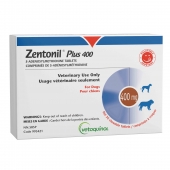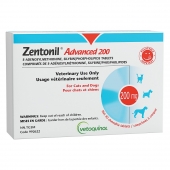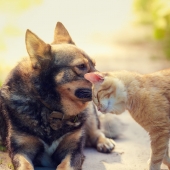There’s more to feline dental health than just having a beautiful set of pearly whites. Adequate dental care through daily brushing and regular veterinary visits helps your cat remain healthy and prevents diseases that may seriously impact their quality of life. Here’s why.
Feline dental diseases are widespread.
According to the Cornell University College of Veterinary Medicine, between 50 and 90% of cats over four years old suffer from some form of dental disease. This makes it highly likely that your pet requires dental care and explains why your veterinarian checks their teeth and mouth during a physical exam.
Dental care helps prevent the most common dental diseases.
Soon after eating, food particles and saliva mix inside your cat’s mouth to create plaque. Plaque hardens into calculus and may eventually cause gums to become red and swollen; a condition called gingivitis. Left unchecked, gingivitis will lead to destruction of the underlying tissues, which can result in complications including bone loss and loose, damaged teeth that must be extracted.
Brushing your cat’s teeth daily helps prevent plaque build-up and can slow or stop the disease process. If your veterinarian observes a dental problem early enough, proper treatment may reverse the damage or at least prevent the condition from growing worse.
Poor dental health puts a strain on your cat’s immune system.
Once your cat’s gums become infected, bacteria are constantly released into your pet’s bloodstream. Their immune system must then fight a never-ending battle against the infection, which causes inflammation and can lead to health problems elsewhere in the body. This is why having good dental health strengthens your pet’s overall health.
Dental diseases can aggravate your cat’s existing health conditions.
If your cat suffers from chronic heart, liver or kidney disease, poor dental health may aggravate such issues. As bacteria enter the bloodstream through infected gums, they can travel through the body to reach these critical organs and worsen existing problems.
Some dental issues in cats can be challenging to recognize.
Bad breath, inflamed or bleeding gums and loose teeth are all observable symptoms of gingivitis and periodontal disease. But many other dental problems require a thorough physical exam by a veterinarian to be diagnosed. These include tooth resorption—which could be described as a cavity that develops from the inside out—or a fracture that may not be readily apparent.
Dental care improves your cat’s quality of life and mood.
Dental disease or damaged teeth can cause severe pain and discomfort for your cat. They may need to favour one side of their mouth when feeding, eat less or refuse to eat at all, drool, and show decreased energy and playfulness. It’s understandable that your cat may feel irritable or depressed in this condition. In many cases, proper dental treatment can resolve pain, improving your pet’s quality of life and getting them back to their usual self.






